Prince Afolabi Aderemi Paul, an Oyo prince from the Agunloye ruling family and a Yoruba diaspora leader, has warned against what he called “dangerous distortions” of Yoruba history, tying his caution to the fresh row between the Alaafin of Oyo and the Ooni of Ife over a Yoruba-wide chieftaincy title recently conferred on an Ibadan businessman.

The controversy escalated this week after the Alaafin of Oyo, Oba Abimbola Akeem Owoade I, issued a 48-hour ultimatum to the Ooni of Ife, Oba Adeyeye Enitan Ogunwusi Ojaja II, to withdraw the conferment of the title “Okanlomo of Yorubaland” on Chief Dotun Sanusi, an Ibadan-based entrepreneur. The Alaafin insisted the Ooni lacked authority to bestow a Yoruba-wide title and demanded a reversal within two days.At first, the Ooni’s palace signalled it would not comply, leaving the issue in the court of public opinion, but in a terse reaction posted by the Ooni’s spokesman, Moses Olafare in his personal capacity, he said he dismissed the deadline with the retort: “48 hours my foot,” indicating that the Ooni would not respond to the threat.
He claimed he was not instructed to make comments by the Ife Palace, while other reports described the Ooni as having “snubbed” the ultimatum, but a few hours after the warning, the title holder proclaimed, it was never a pan Yorubaland title, “I was honoured Okanlomo of Oodua.”
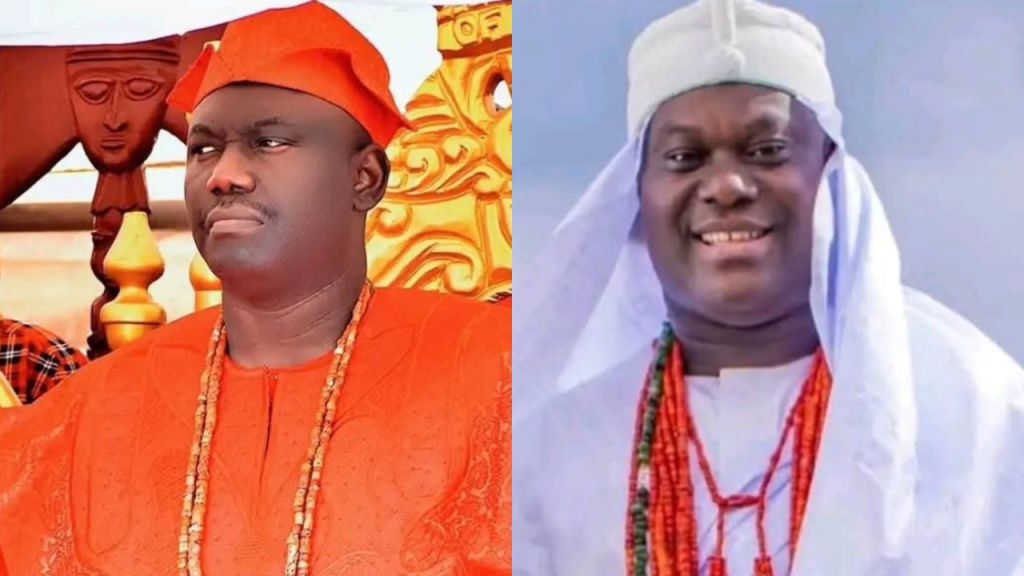
While social media platforms have gone agog, public figures, elders, and civic groups have since appealed for calm as tensions rose between the two palaces over the chieftaincy question and the scope of authority it implies. Many warned that the matter, if mishandled, could reopen long-standing fault lines within the Yoruba traditional system.It was against that backdrop, Prince Aderemi cautioned commentators and political actors to understand the age-old division of roles before inflaming matters further. “Let us be clear,” he said.According to him,
“The Alaafin’s throne has, for centuries, exercised secular supremacy, executive, administrative, and military, across Yorubaland. The Ooni’s stool is spiritually primordial, custodian of our origins and the consecrator of authority.”
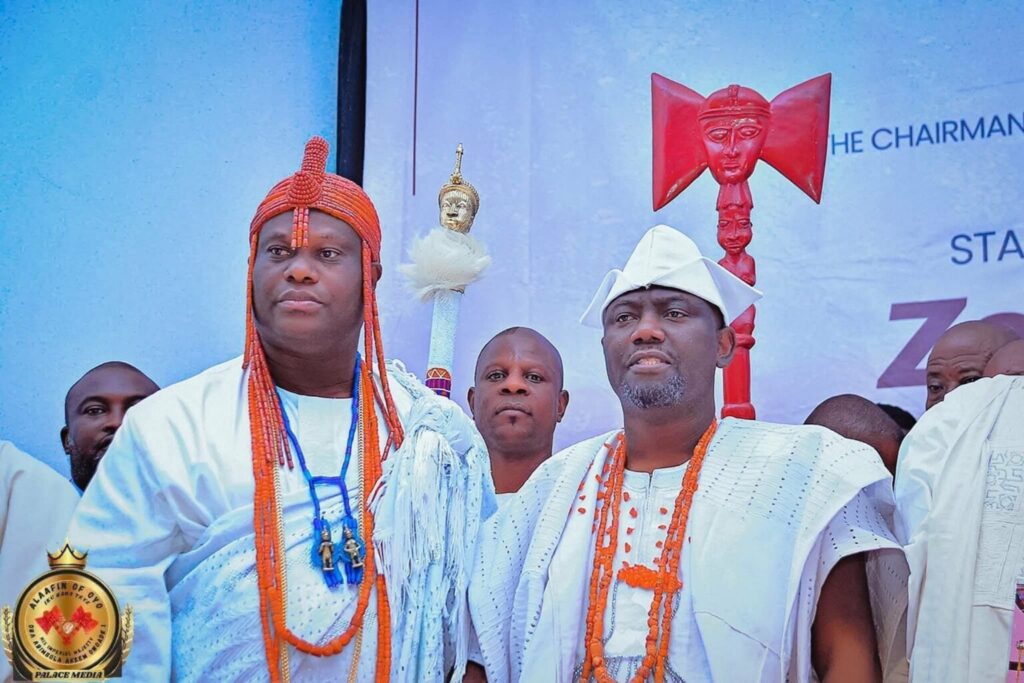
He said, “to understand this dynamic, one must first separate the concepts of spiritual primacy and political sovereignty. Spiritual primacy is rooted in sanctity, tradition, and the reverence. Political sovereignty is built on administration, military might, economic control, and the authority to command obedience.
”“The history of Yorubaland, from its mythical beginnings to the zenith of the Oyo Empire, is the story of how these two centers of power, Ile-Ife (the sacred religious source) and Oyo (the imperial capital) evolved their respective roles, with the latter often acting as the executive arm of a civilization whose soul resided in the former. Oyo protected Ife, collected taxes and tributes during the 15th -20th century Yoruba internal wars,” Prince Aderemi said.
He warned that conflating those realms fuels avoidable conflict, saying, “When people collapse spiritual primacy into political sovereignty, they manufacture rivalries that our forebears resolved long ago.”
“The stool of the Ooni consecrates; the throne of the Alaafin governs. One blesses; the other commands. Once the 7 members traditional cabinet (Oyo Mesi) selects an Alaafin, the Ooni is the Chief Priest/Pontiff of the Yoruba world, the keeper of the sacred relics, and the figure who presides over the rituals that connect the people to their divine origins,” he said.
Continuing, Prince Aderemi said, “The two previous handlers of the Ooni, Ooni Aderemi and Ooni Sijuade’s eagerness to merge the spiritual and secular roles to have an Imperial king of Ife agog with the political intervention of Chief Obafemi Jeremiah Awolowo (Leader, Action Group) and Chief Bola Ige after the mysterious death of Chief Bode Thomas (Deputy Leader, Action Group) during the open confrontation with Alaafin Adeniran Adeyemi II stopped this sacred role by subsequent Ooni’s. This is the genesis of today’s tensions. Ife has never risen in defiance to Oyo imperialism. The same is the reason Bini monarchy, a descendant of Oranmiyan is disassociating itself from Ooni and Ife.”
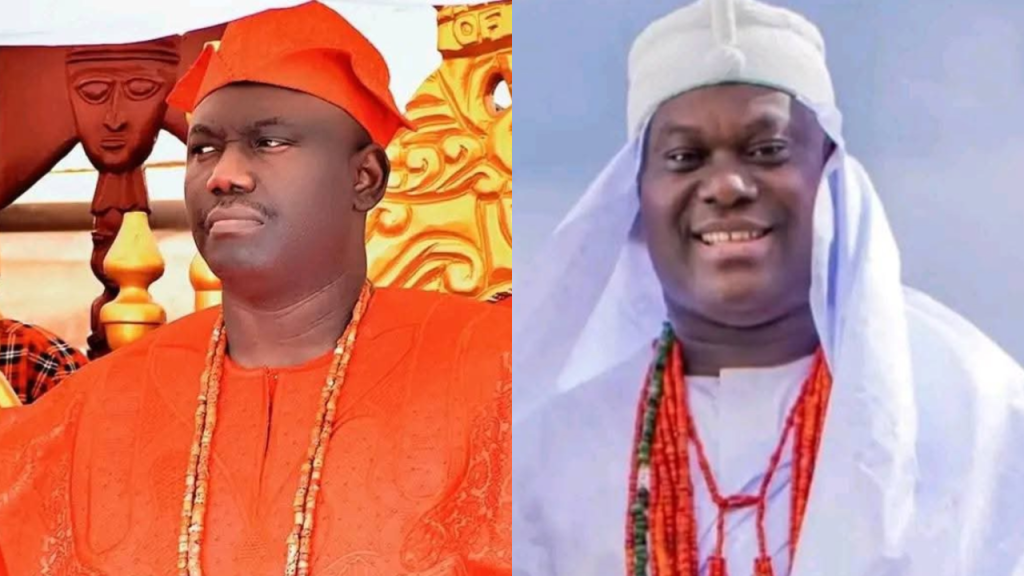
Prince Aderemi tied the present row directly to that duality. “A Yoruba-wide chieftaincy is, by definition, a secular-imperial expression. Historically, that belongs within the Alaafin’s orbit. The Ooni does not administer an empire. He is likened to the Archbishop of Canterbury, the spiritual leader of the Church of England and the Anglican Communion.”
This role, “though symbolic, is the same in modern monarchies of Englad, Rome, Spain, Japan and others. Ooni represents the transmission of authority from the spiritual source (Ife) to the secular executor (Oyo). It validates the kingly authority of the imperial decendants of Oranmiyan, a function that underscores his primacy in the ritual and cosmological order. It symbolises the fount of legitimacy, but not necessarily the wielder of the power that legitimacy enables,” Prince Aderemi said.
He argued that history is unequivocal about the Alaafin’s imperial spread. “From Oyo Ile radiated authority that levied tribute, appointed provincial rulers, and commanded cavalry that held the plains, mountains and valleys of what is South-West Nigeria to the tributary of river Volta. This is executive power, not ritual symbolism.”
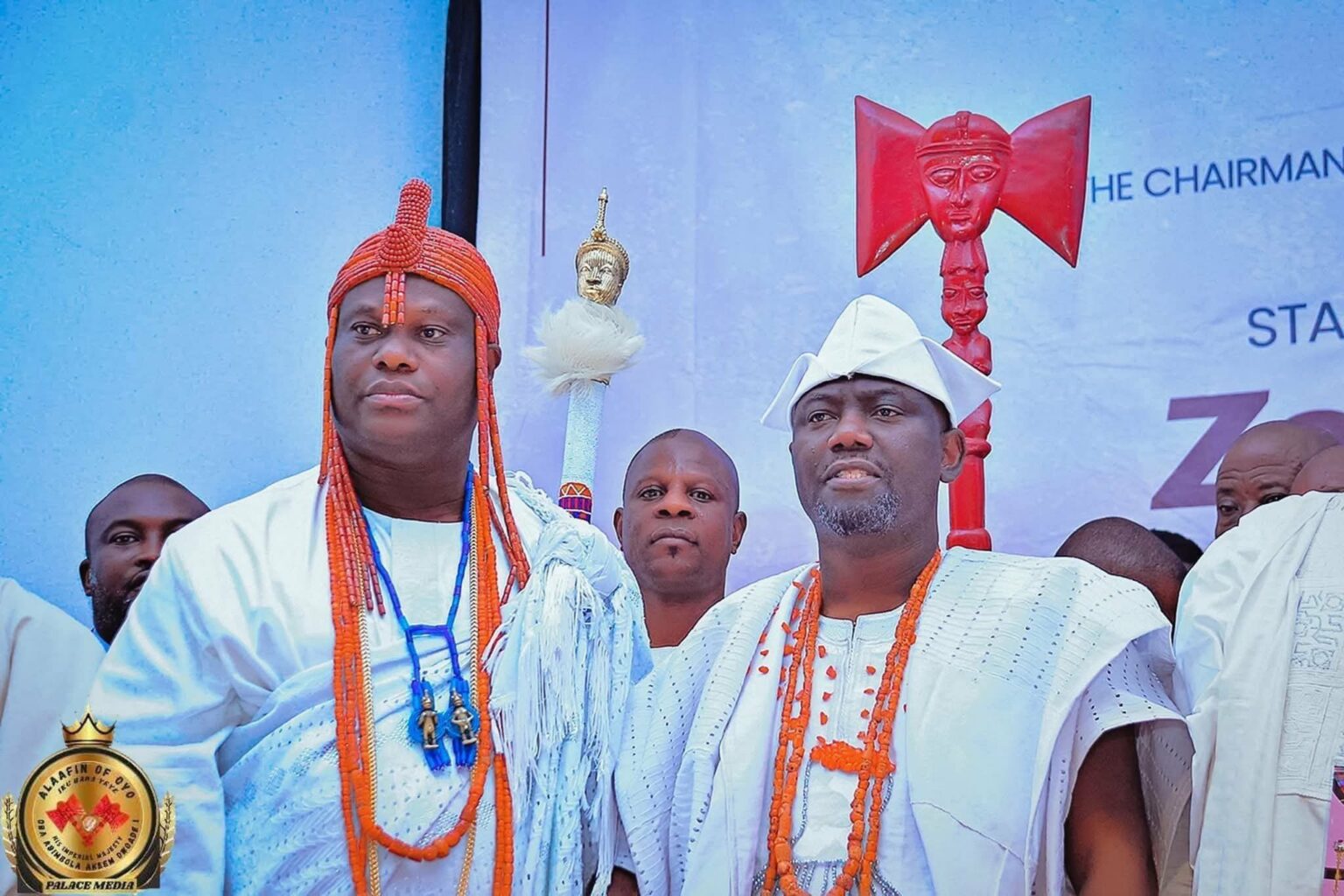
The prince stressed that recognising Oyo’s secular reach does not diminish Ife. “Ile-Ife anchors our soul. Without the Ooni’s blessing, no Yoruba king is complete. But blessing is not governing; consecration is not command.”
“Moreover, no Ooni has ever claimed to be a direct descendant of Oduduwa. They are the custodian of this holy relics. This separation of the spiritual and secular capitals was institutionalised by Oranmiyan’s appointment of Adimu as regent in Ile-Ife. Adimu, (Omo Oluwo ni, contracted to Owoni). He was entrusted with the royal treasures and the worship of the national deities, Idi and Orisa Osi. Adimu’s families have produced all the Ooni to this day, alongside Ayikiti from opo Labiran, the Ooni who was supported by the Ibadan military leaders”.
He pointed to founding traditions to explain the balance. “Oranmiyan bridges the sacred and the imperial, drawn from Ife’s source yet building Oyo’s engine of state. In that settlement lies our peace: Ife as the font of sanctity; Oyo as the seat of sovereignty.”
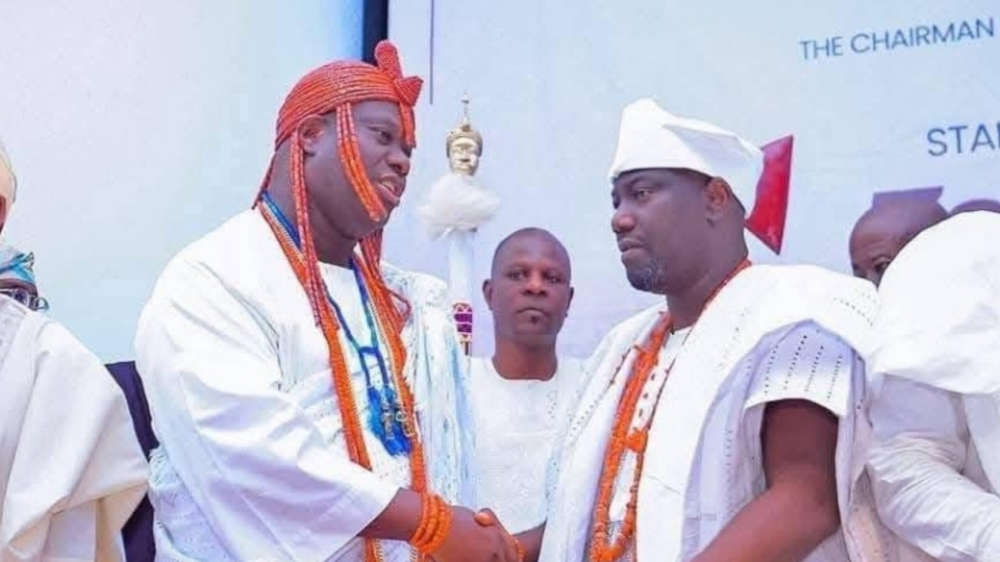
“Alaafin for many centuries confer pan-Yoruba titles, from Arigidi Akoko, Jabata, Ajase, Ibadan, Ilorin, Abeokuta, Dahomey, Ogbomosho, Eko/Lagos, and recently Chief Wasiu Ayinde Omogbolahan of Ijebu Ode, Ogun state as Mayegun of Yoruba land. Definately every Oba can confer his kingdom title on whoever he consider fit, but not for Yoruba land,” the prince said.
He went further to spell out the unique titles of both stools: “The Alaafin is emperor in the secular sense, Ikú Bàbá Yèyé, whose charge historically included life-and-death authority, taxation, and defence. The Alaafin is feared more than the gods. The Ooni is our pontiff, the Pope/Chief Priest who guards the sacred narratives and mediates blessings for the Yoruba nation,” saying, “These are verifiable century old histories, well documented in ancient books world over about the Yoruba nation.”
He warned that politicising the divide erodes the very dignity of both stools. “When a spiritual throne reaches for secular power, or when a secular throne neglects spiritual sanction, both suffer. Our ancestors built a genius arrangement: two supremacies, distinct and mutually reinforcing.”
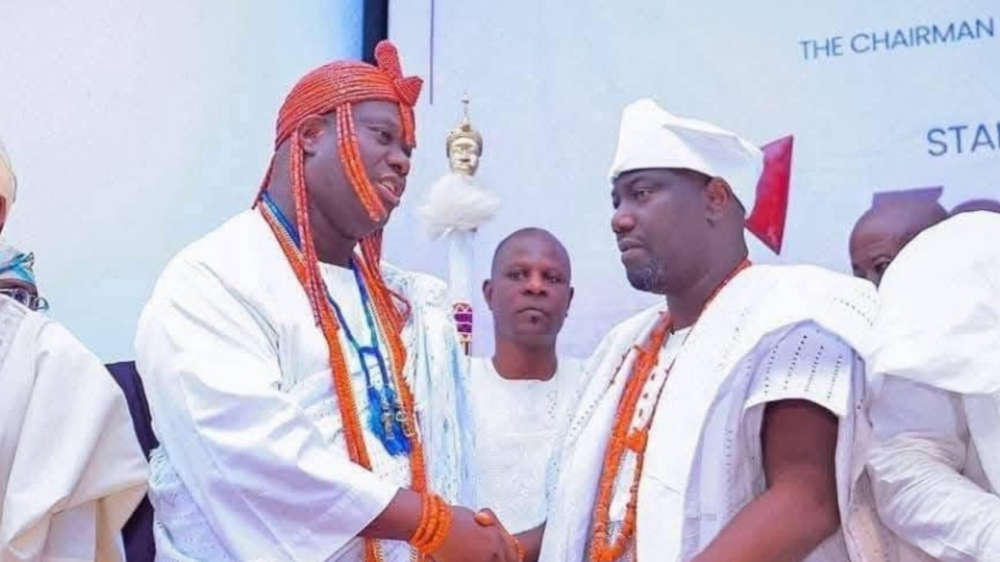
Recalling imperial practice, he added: “The Alaafin’s court was a government, Oyo Mesi, Ilari, provincial systems, cavalry logistics, same like the Roman Empire. That is why foreign government still teach Oyo governance system in their textbooks. By contrast, the Ooni is not remembered for campaigns but for consecrations.”
Prince Aderemi said modern interventions had occasionally muddied the waters. “There have been seasons when priestly roles were stretched toward imperial claims. Those moments were political, not historical. Example is in Iran, 1979. The record are there in the national archives, go to Ibadan, Calabar, Enugu or Kaduna. Records puts the Ooni in spiritual primacy and the Alaafin in secular sovereignty.”
To explain his perspective, the prince drew on his personal upbringing and deep research into Yoruba history. “As a Prince from the Agunloye royal family of Oyo Alaafin, I grew in the royal home learning from the wisdom of my ancestors,” he said. “I learned not just from oral history but from century-old history books, colonial and post-colonial government gazette, foreign diplomatic letters, oral and sacred traditions of Ifa, diaries, speeches, scholarly articles, visits to museums and historical sites/monuments which provided me tangible experience.”
He explained that many casual observers today draw conclusions on supremacy from “modern political geography (creation of Oyo and Osun states), social media hype/sensations or the spiritual reverence afforded to Ile-Ife as the cradle of Yoruba civilization.” But he maintained that deeper records told a different story.
“However, a deep dive into the historical record, particularly as meticulously documented, reveals a more nuanced reality,” Prince Aderemi said. “Numerous evidence suggests that while the Ooni of Ife holds an unassailable and undebatable position as the spiritual head and custodian of origin myths, the Alaafin of Oyo for centuries, historically established and exercised a distinct, tangible supremacy in secular, political, and imperial power over the vast expanse of Yorubaland.”
Returning to the present, he appealed to both palaces. “Let tradition speak. If a title is Yoruba-wide, let it be processed within the secular-imperial framework of Oyo with the spiritual imprimatur of Ife, so that neither realm is diminished and both are honoured.”He continues,”the chief Imam of Saudi Arabia will never unsweep the kingdom with the Saudi king on the throne”. They are two distinct roles, complimenting.
He reiterated his central caution to the public. “History is not a hashtag. The throne of the Alaafin ruled the land; the stool of the Ooni consecrated it. To deny either truth is to weaken Yoruba civilisation itself.”
The prince framed the way forward as a reaffirmation, not a contest. “May the Ooni remain the soul of our nation and the Alaafin its body. May wisdom prevail so today’s disagreement becomes tomorrow’s lesson in balance, not a rupture in heritage.”
He concluded emphatically: “This moment calls for clarity, humility, and fidelity to our fathers’ settlement. Emperor and Pontiff, distinct role, and indispensable.”

















No Comment